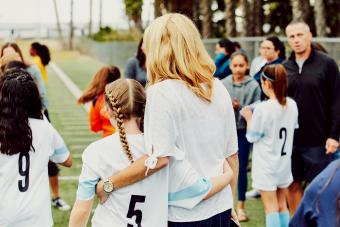
At some point, your child will probably try their hand at a sport or two. When kids play sports and stay committed to them over time, the experience becomes a family affair. Before you know it, you are a dance mom or a soccer dad, and you are just as invested in the sport as your kid is. It's okay to love your child's sport, as long as you know how to be a good sports parent.
Be There When You Can
No one wants to sit at a two-hour practice three times a week. You probably dread long tournament weekends like the plague (after all, you could be at Costco or Target on your days off instead of sitting in a freezing ice rink). Your child's sport can feel like a monkey on your back, but you need to be a good sports parent and support your kid and the team (even if the team is legit worse than the Bad News Bears were). Do you need to be at every single sporting event your kid does? Absolutely not, especially if you have other children, a full-time job, or any semblance of a life. Make it to what you can. Let your kids see that you support them in their endeavors, and that you will even give up a weekend at Costco for them.

Think About Your Feedback and Critique
Because you spend countless hours watching your kid play their sport, you have likely become some kind of bona fide expert at all things related to the game (in your mind, at least). Tone down your advice and feedback. Don't spend the entire car ride to the game reminding your kid to do this or remember that. They have a coach who is more than capable of drawing your kid's attention to certain aspects of the game.
Don't make the ride home one game recap after another, detailing every play, call, and moment (good or bad) as if you are now hosting Hockey Night in Canada. Your kid knows what happened in the game; they were there.
Kids experience all sorts of pre-game and post-game emotions, and your commentary might not be as beneficial to their well-being as you intend. Good sports parents choose moments to discuss the game wisely. They read their kid's cues before jumping in with thoughts and opinions. They also use positive and specific wording to highlight what they want to say. Examples are:
- That toss to Johnny in the second half was a great double play!
- You made some really great passes in the second half while you were playing midfield.
- I loved how you communicated with Ellie when you both were back playing defense; so smart.
Make sure that following a loss, you give helpful words of encouragement. Passionate kids take losses hard, and it can be difficult for them to process their feelings following a heartbreaking game.
- You really gave it your all, and that should make you proud.
- Everyone has a game like this, bud. We know it stings, but this feeling won't last forever.
- Yes, there were many tough moments on the field today, but your team did do some good things as well.
Stay Positive (Even When That Other Team Played So Dirty)
It's okay to feel passionate about the team that your child plays for. If your child has been involved in a sport for several years, the teammates, coaches, and other parents have likely become a close-knit community in itself. You all watch games together, go to team functions, and travel as a unit to wherever the away games might be. These are your people, and you love them. You don't want to see another team, ref, or umpire do them dirty. At some point, your kid's team will play a team whose mamas didn't raise them right, or in other words, they will be subpar in the sportsmanship department. You'll get a ref who seems to make all the wrong calls, and this can cost your team the game. These occurrences will happen, and they will stink. How you handle them will make you either a good sports parent or one that needs some anger management classes.
A good sports parent fights the urge to throw a garbage can onto the ice rink, pick a fight with the other team's parents, or trash talk the other team for the entire ride home. A great sports parent holds their head up high, focuses on the positive, and refrains from badmouthing anyone involved in the game. (Sidenote: It is okay to fantasize about throwing that garbage can onto the ice over a bad call, just don't actually do it). Keep it classy, moms and dads. This is kids' sports.

Be Active As Well
If you want to be a good sports parent and encourage your kid to continue athletic endeavors, be active yourself as well. Studies show that when parents are physically engaged in activities, their kids often follow suit. This doesn't mean that because your child plays soccer, you have to run out and join an adult league, but if you have a budding athlete, you might try to get active too. Exercise regularly, discuss the importance of strong bodies, and fueling yourselves properly so that you can be your very best when game time comes.
Try to take time out of your day to practice your kid's skills with them. Remember, you are just a good sports parent helping your kid out, and bonding with them over what they love... not their backyard personal coach, working on getting them to the next Olympic games.
Minimize Growing Egos and Encourage Multiple Sports
In your opinion, it is crystal clear that you are raising the next Wayne Gretzky. Your kid is darn special, and their talent is simply undeniable (again in YOUR OPINION). You can praise and encourage them, but don't create a monster. In other words, don't feed their ego. No one wants to coach or play with a kid who firmly believes that they are leagues above everybody else. Let them know that you think they are great, but don't allow their head to get too big.
While it might be clear that your child has a penchant for one sport over another, try to encourage them to play multiple sports. Committing to only one sport early on can lead to burnout, injuries, or deep disappointment should they ever not make the team in the sport they have dedicated all of their time to playing. Good sports parents know the importance of trying many sports out early, and allowing their kids to explore several options of staying active and engaged in team sports.

Keep Your Eye on the Process and the Present
Parents, sporty ones or otherwise, often struggle to stay in the moment. They are planners, have natural foresight, and are always anticipating the next step in life. This sometimes thwarts their ability to be in the moment. Good sports parents don't put pressure on the playoffs, the championship game, or the hypothetical college scholarship that they are convinced is someday headed their kid's way. They place importance on the game at hand, the great practice they just saw, and the now. Good sports parents value the process, the learning, and the growth, over the future skills that are beginning to bud, or accolades they see coming down the pike.
Your Kid Plays a Sport, Not You
When your kids are little, you watch them bumble around on the soccer field, and you laugh and clap at the cuteness and hilarity of it all. When they start T-ball, you giggle and wave when they cartwheel in the outfield and spend more time picking daisies than they do keeping their eye on the ball. A few years later, they are in travel sports, and sports are now all business. You start to introduce your child as "a soccer player" or say things like, "Oh, we are a football family." All of your conversations revolve around the sport that you dedicate countless hours to (seriously, don't even try to count up the time you have spent driving back and forth to practices and games because it will straight up depress you). You have become the sport.
You, your kid, and the sport are all suddenly one and the same. Losses affect you, poor game performances reflect on you, and before you know it, you seem to care more about your child's sport than they do. Good sports parents can separate themselves from the sports that their kids play. They know that these are just games, and furthermore, they are games that have literally nothing to do with them.

Always Be a Parent First
It can be hard to always be a perfect sports parent; after all, you are only human. All you can do is try to be your best for your child as they take on the world of competition and athletics. Remind yourself that you are only a spectator in their journey, and it is THEIR journey. Be supportive, encouraging, and know your role when it comes to sports.







